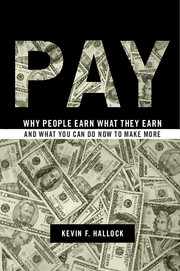Book contents
- Frontmatter
- Contents
- Figures
- Tables
- Acknowledgments
- PART I HOW HARD CAN THIS BE?
- PART II HOW ORGANIZATIONS SET PAY STRUCTURE AND WHY
- PART III HOW PEOPLE ARE PAID CAN MEAN AS MUCH AS HOW MUCH THEY ARE PAID
- PART IV WHAT YOU CAN DO TO MAKE MORE AND CONCLUDING COMMENTS
- 14 What You Can Do Now to Make More Now and Later
- 15 Concluding Thoughts on Pay
- Notes
- References
- Index
14 - What You Can Do Now to Make More Now and Later
from PART IV - WHAT YOU CAN DO TO MAKE MORE AND CONCLUDING COMMENTS
Published online by Cambridge University Press: 05 October 2012
- Frontmatter
- Contents
- Figures
- Tables
- Acknowledgments
- PART I HOW HARD CAN THIS BE?
- PART II HOW ORGANIZATIONS SET PAY STRUCTURE AND WHY
- PART III HOW PEOPLE ARE PAID CAN MEAN AS MUCH AS HOW MUCH THEY ARE PAID
- PART IV WHAT YOU CAN DO TO MAKE MORE AND CONCLUDING COMMENTS
- 14 What You Can Do Now to Make More Now and Later
- 15 Concluding Thoughts on Pay
- Notes
- References
- Index
Summary
Remember back in Chapter 3 that we considered what people earn and started a discussion about why. Some of the things that are related to pay are measurable and some are not. Some are also changeable and improved upon and some are not. For example, you can improve your education (this is measurable and improvable) and you can also increase your motivation and organizational ability (but these are hard for economists to measure and even sometimes hard for employers to see or recognize [at least from a resume or a job interview]). This section includes a set of things that one can do to increase his or her wage, salary, and total compensation. Some of it is long term in the sense that it takes a while to earn a high school degree, or a college degree – but we know those with them earn a lot more than those without.
Easy Stuff
I’ll start with what I call easy stuff. This includes things like be polite, show up on time, work hard, be nice, be kind, don't be a jerk, think before you act, get along with your coworkers, and so forth. Of course, this is “low-hanging fruit.” But many managers and people who set compensation levels do not have a lot of training in how to deal with compensation, especially in smaller organizations. This problem is exacerbated by the fact that many workers are similar and do similar jobs. Why not do the easy stuff and get that out of the way? Then you can work on the more difficult things, discussed later in the chapter.
- Type
- Chapter
- Information
- PayWhy People Earn What They Earn and What You Can Do Now to Make More, pp. 187 - 195Publisher: Cambridge University PressPrint publication year: 2012
- 1
- Cited by



